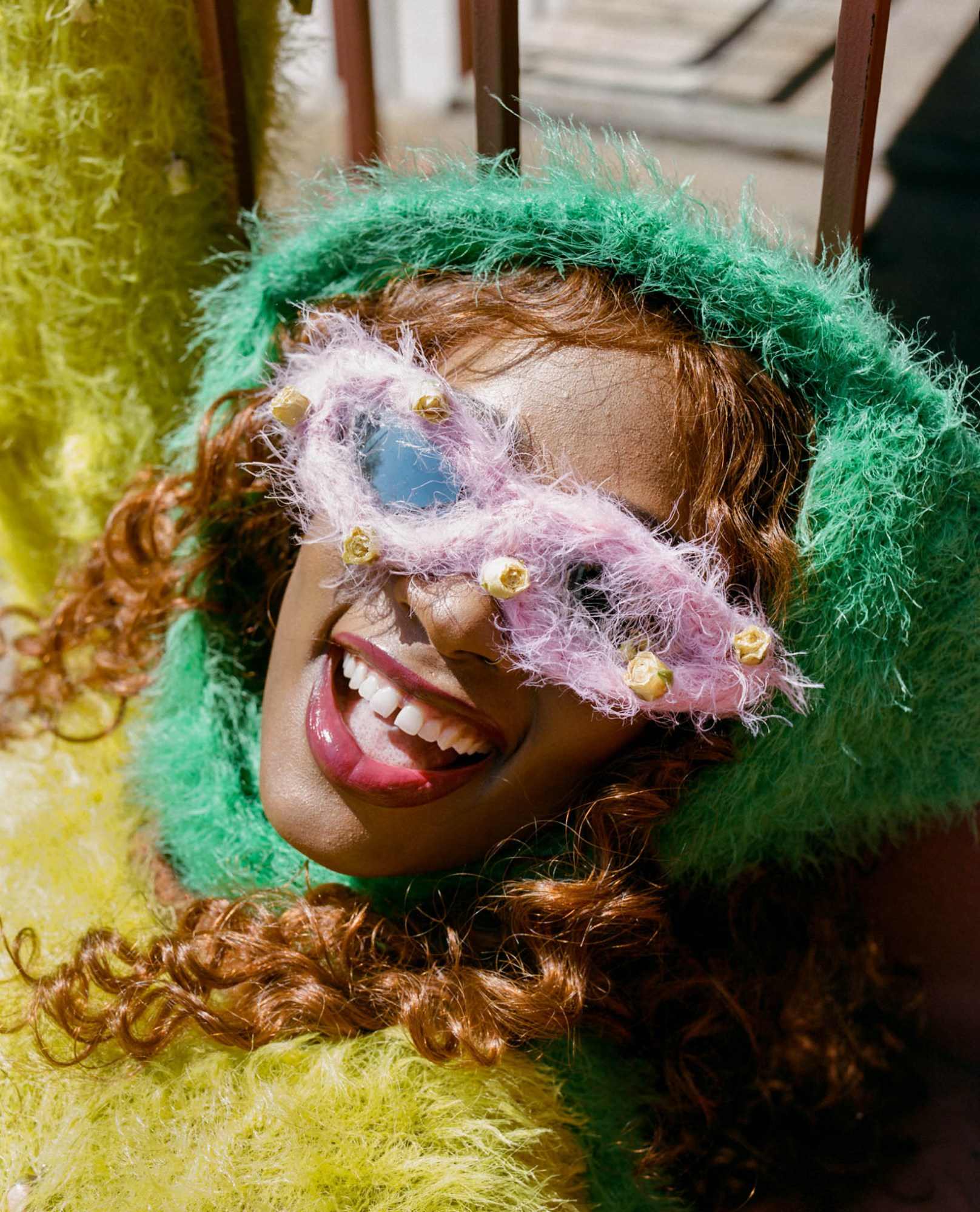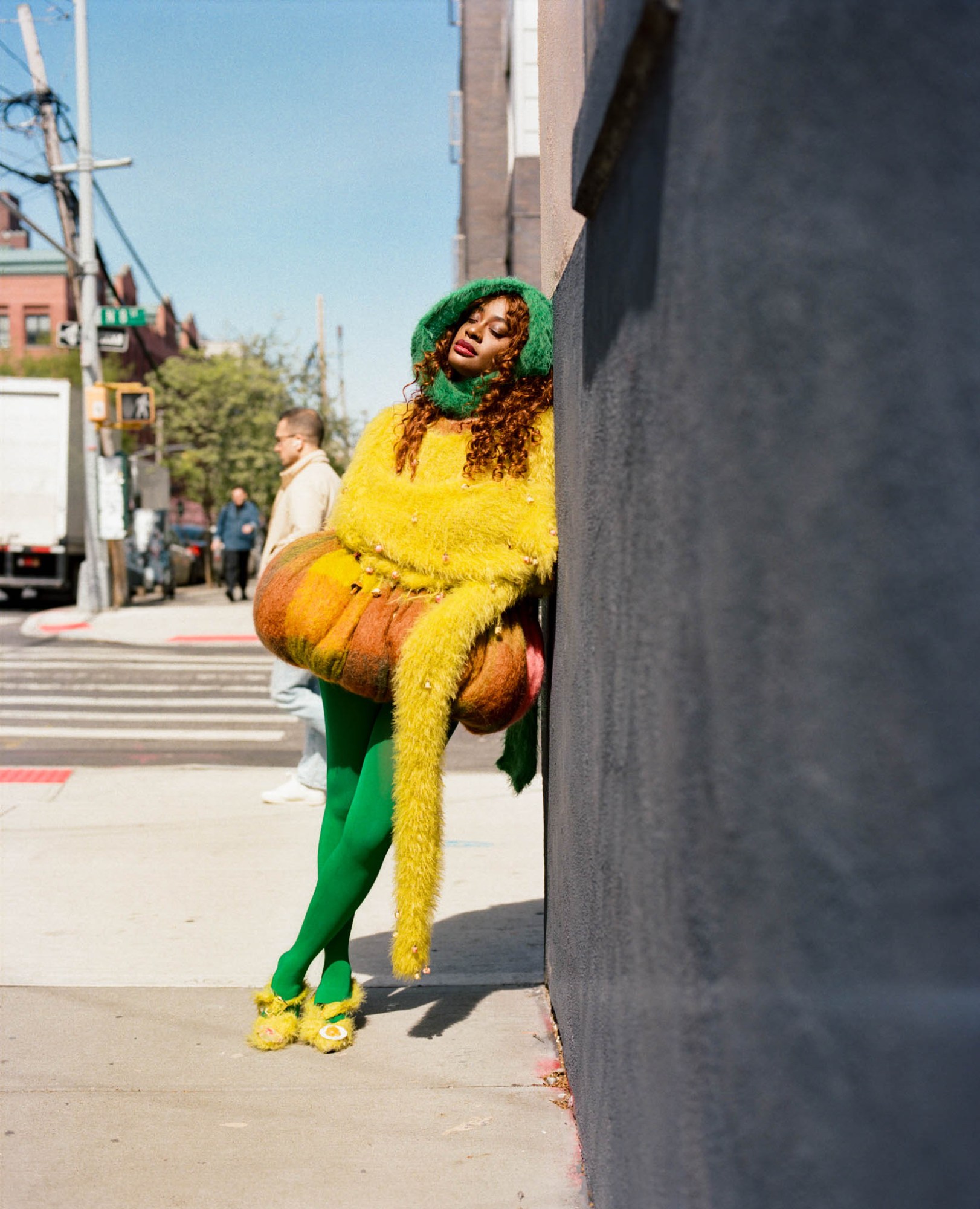Grief is just as foundational to the human experience as joy and love, but it’s much harder to capture. Albums about breakups or bereavement are often stereotyped as teary-eyed and acoustic, or guitar-heavy — cathartic for some, but also a deterrent for listeners who don’t want to wallow. Kari Faux’s new album Real Bitches Don’t Die is as complete a meditation on loss as any artist has put out in ages, precisely because it isn’t just about absence.
“Grief is a lifelong thing, it doesn’t end. When you lose someone that you really love and are close to, you’re always grieving, but you’re not grieving for the rest of your life,” Kari says over coffee in Brooklyn. “There are moments where you’re like, ‘I’m outside, I’m lit, I’m turnt up with my friends,’ and then the next day, you can be like, ‘Damn, I really miss so-and-so,’ and cry about it all day.”
The 30-year-old musician has been one of the most thrilling voices in independent hip-hop for a decade now, becoming an internet darling with 2014’s Laugh Now, Die Later, and winning fans and collaborators in Childish Gambino and Isaiah Rashad. Hailing from Little Rock, Arkansas, she’s part of a lengthy lineage of rappers who combine a charming Southern breeziness with a frank emotional vulnerability. Kari also supplements that with a genuine left-field sensibility — she sounds as comfortable rapping nimbly on 808-heavy tracks like “StickUp!” as she does crooning on jazzy records like “Facetious.” She sums up her appeal beautifully on Real Bitches Don’t Die’s “Drunk Words Sober Thoughts”, rapping, “This is for my gangsta bitches that need forehead kisses.” It’s a perfect distillation of Kari’s broad musical appeal. This album specifically though, is a multi-dimensional look at mourning, how it manifests itself not just in all-consuming sadness, but in almost imperceptible ways as you live life.
The significant losses for Kari date back years, beginning with close friend and fellow musician Chynna Rogers, who died the day after Kari released her last project, Lowkey Superstar, in April 2020. The loss of a cousin the following year added to the weight on her shoulders, which is felt from the opening bars of the album’s intro and title track.

“My mama seen me cry, she wiped my eyes / Things she would say to ease my mind / ‘Real bitches don’t die’ / My auntie laid to rest / She know me best / Her words still be playing in my head / ‘Real bitches don’t die,’” Kari sings on the pensive, percussion-less track. Nowadays, there’s pressure on independent artists to be prolific year in and year out, and while you could never call Kari a slacker, she’s just as intentional about taking time to not make music as she is hunkering down in the studio when the moment hits.
“I like to take long stints of time to not make anything. I’ll still write, but I won’t actively be in the studio,” she explains. “I’ll just live life and see how I’m feeling, write down a phrase, write something that feels more like a poem and then when it’s like, ‘I’m making an album,’ I’ll revisit those thoughts and try to elaborate to where it could be a song.”
Real Bitches Don’t Die is a masterstroke in the increasingly lost art of album sequencing. Beginning with the title track and closing with the contemplative “Borrowed Time,” these records create the framework around which everything on Real Bitches Don’t Die exists. Kari explains that the LP works as “a perfect loop” in the vein of Kendrick Lamar’s good kid m.A.A.d city, but more than that, it’s a record where grief is an undercurrent that makes the celebratory moments more meaningful and more poignant.
“Sometimes I feel like I’m that bitch and sometimes I feel like I’m sad as fuck,” Kari says. “All of those emotions are important, they all have their place and they all keep me feeling grounded and feeling human. I never wanna be too far off the ground.”
Tracks like the self-affirming “Me First” and the deeply funky “Turnin’ Heads” are an absolute blast, but they don’t cheapen the emotion that comes from the more somber songs. “I’m goin’ hard in the paint / Stunt for my n***as who can’t / I’m out here havin’ my way / I made this shit in a day,” she sings on the latter, a deeply funky Southern rap blast with a memorable slap bass line.
SUBSCRIBE TO I-D NEWSFLASH. A WEEKLY NEWSLETTER DELIVERED TO YOUR INBOX ON FRIDAYS.
Though loss and absence inform much of the album, there is one major addition to Kari’s life whose presence is felt throughout the record: her partner and producer Phoelix. Known for his work with Noname and Smino, the Chicago artist is a natural fit with Kari thanks to his versatility and rich musicality. The pair had one credit together, Jean Deaux’s 2018 song “Work 4 Me,” but had never spent much time together otherwise. “I would see him in passing because we had a lot of mutuals in the Chicago scene, but we had never actually had a conversation or anything. It was always like, ‘Oh, we should work,’ and that never happens,” Kari recalls.
She began working on her LP in Houston, after relocating to Texas from LA, writing “Dog” and “Real Bitches Don’t Die”, but was battling loneliness and depression. At the repeated suggestion of close friend theMind, she wound up on a flight to Chicago in May 2022, a trip that would change her musical and personal trajectory.
“It wasn’t romantic at first, we were just friends. We’d have a conversation, and then it turned into something — I was like, ‘You like me,’ and he was like, ‘So? You like me,’ and I was like, ‘So?’” Kari says with a laugh. “Then it just became this thing where we wanted to be with each other, and we’re really good at balancing the work-life thing. We can transition to any mode of functioning together, so it’s really easy.”

Kari took Phoelix back to Houston, and the two have been together ever since. She even brought him to Arkansas recently, where he attended a family reunion and got to see firsthand how she grew up. As it often happens, Phoelix being a fish-out-of-water allowed him to notice things that had unconsciously been part of Kari’s life; some of those insights helping create the texture on Real Bitches Don’t Die. “White Caprice” gleams like a candy-painted car, seeing Kari collaborate with the legendary Memphis MC Gangsta Boo, who passed at the beginning of the year. It also includes a particularly subtle Easter egg, a blink-and-you’ll-miss-it moment that alludes to Kari’s hometown, and the time they spent there together. “We always would get caught at the train tracks, just sitting there waiting for this train to pass by, so he put it in the song,” Kari says.
For Phoelix, entering Kari’s world was creatively essential, bridging the divide between their respective upbringings and helping fuel his consistently excellent work behind the boards. “Me being from the Midwest, her being from the South, there’s certain things that just didn’t make it on both sides,” he says. “She was showing me a lot of things that inspired her.”
Phoelix says the album came together “pretty much instantly,” but that nailing the closer, “Borrowed Time”, proved to be a protracted process, taking roughly a month. Tender and pensive, the track sees Kari oscillate between rapping in a tempered, almost spoken word style, before singing in full force on the hook accompanied by a swirl of electric guitars. “Will I ever find the words to say / That convey / The feeling knowing that I can’t see your face,” she wonders on the first verse. Though she’s searching for words, she’s also found a valuable truth that anyone who has ever grieved will recognise — figuring out how to honour those you lost and continue to live a full life, is a continual process. There is no perfect, pithy phrase, there’s just a lot of work and an occasional moment of beauty that encourages us to keep going. With Real Bitches Don’t Die, Kari Faux has captured that beauty and stretched it out to album length.
Credits
Photography Nuvany David


